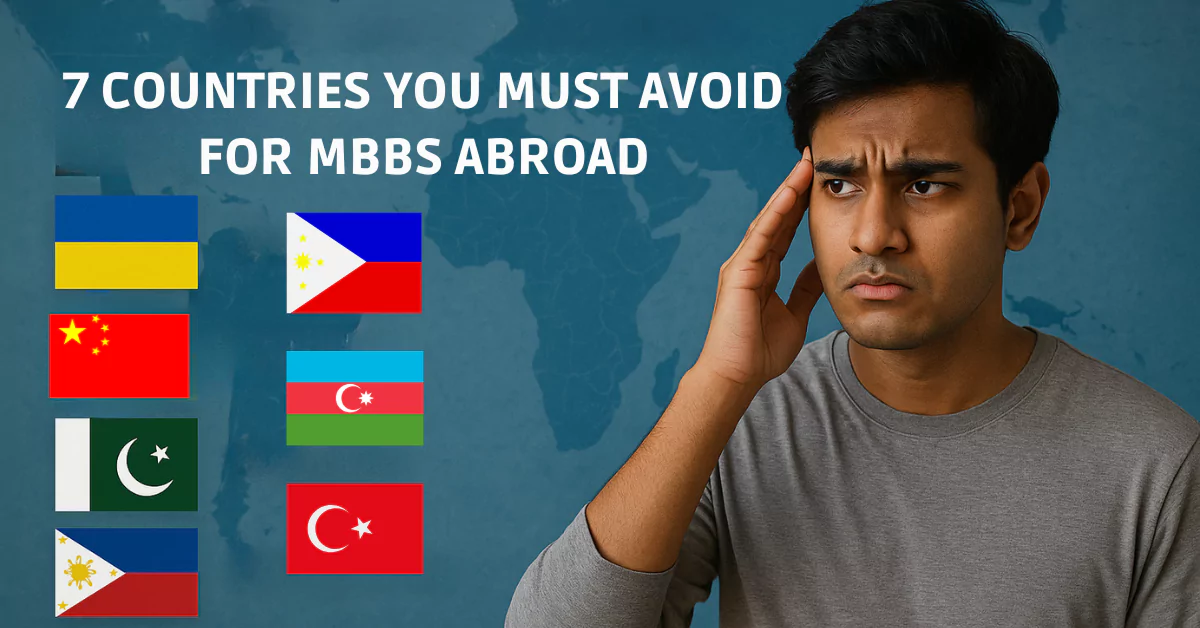7 Countries You Must Avoid for MBBS Abroad: About 30,000 Indian students go abroad to pursue an MBBS degree every year. But not all destinations are equal. Some offer poor clinical training, unreliable degrees, or high visa risks. Many of them aren’t even approved by the National Medical Commission (NMC). It means that you can’t practice in India after graduation. Several countries, despite offering low tuition fees, pose serious challenges in terms of safety, recognition, language, and future practice in India.
In this article, we list 7 countries Indian students should avoid as MBBS abroad destinations, with real-world data and cautionary insights.
7 Countries You Must Avoid for MBBS
Here’s a list of 7 countries Indian students should avoid when choosing an MBBS abroad destination.
1. Pakistan
- Not Recognised by NMC: As of the latest notifications, Pakistan’s medical degrees are not recognised by the National Medical Commission (NMC) of India. This means students graduating from Pakistani medical colleges are ineligible for licensing exams like FMGE/NExT in India.
- Geopolitical Tensions: Cross-border hostility makes it legally and diplomatically risky. Indian students may face surveillance, visa issues, or legal restrictions.
- Zero Career Value in India: Even top-performing students from Pakistan find it difficult to validate their degree back home.
Special Note: Avoid completely. No recognition, no scope, high risk.
2. Philippines
- MD Degree Format: Medical courses in the Philippines award an MD degree, not an MBBS. Though considered equivalent, this confuses NMC screening.
- High FMGE Failure Rate: FMGE pass rates for students from the Philippines are very low. In Dec 2023, only around 15-18% of test-takers cleared the exam.
- Longer Duration & Pre-Med Trap: Students must do a 1.5-2 year “Pre-Med” before actual medical training begins, which adds to the total time and cost.
- Unregulated Agents: Reports of fraudulent admissions, fake promises about fees, and incomplete documents are increasing.
Poor academic outcomes, hidden costs, and licensing issues make this a risky destination.
3. Ukraine
- Ongoing War Crisis: Since 2022, Ukraine’s war with Russia has severely disrupted education. Thousands of Indian students were evacuated mid-course.
- Online Degrees Not Accepted: Students who were shifted to online mode during the war may face problems with NMC, as it doesn’t recognise “online clinical training”.
- Safety Concerns: Frequent bombings, air raid alerts, and loss of infrastructure still plague the country.
- Doubtful Return on Investment: Even if education resumes, degree continuity and safety remain unpredictable.
Unstable situation; don’t risk your life and future for lower fees.
4. Iran
- Political Instability: Iran remains under heavy international sanctions and has volatile domestic unrest.
- Cultural & Legal Restrictions: Especially for female students, strict dress codes and social restrictions apply.
- Language Barrier: Most universities teach in Persian (Farsi). English-medium programs are rare and of questionable quality.
- Recognition and Exposure: Limited global exposure and difficulties in getting internships or hands-on hospital experience.
Unfavourable academic, cultural, and geopolitical environment.
5. China (Select Universities)
- NMC Non-Recognition of Online Mode: During COVID, many Chinese universities conducted online-only classes for over 2 years, especially for international students.
- Language Challenge: Though initial years may be in English, clinical rotations often require Chinese language proficiency.
- Limited FMGE Success: Many Indian students from lower-tier Chinese universities struggle to clear FMGE, with pass rates as low as 10-15%.
- Strict Visa & Political Environment: Diplomatic friction between India and China creates additional complications.
Only a handful of top universities are reliable. Others may leave you stranded academically and professionally.
6. Azerbaijan
- Very Low FMGE Pass Rates
- Azerbaijan and similar CIS nations consistently report FMGE pass rates below 15–20%.
- This indicates poor academic preparation for Indian licensing exams.
- Language Barrier
- Despite “English-medium” claims, many classes shift to Russian or Azeri during clinical years.
- Communication issues impact both learning and hospital exposure.
- Limited Clinical Exposure
- Students often report minimal hands-on patient interaction.
- Clinical rotations are poorly structured, affecting real-world training.
- Unregulated Private Colleges
- Rise of low-quality private institutions targeting foreign students.
- Many lack proper faculty, accreditation, or hospital tie-ups.
- No Alumni Network or Global Recognition
- Degrees from Azerbaijan are not widely recognised internationally.
- Poor alumni presence in India makes career mentorship difficult.
Unless it’s a reputed government university, it’s better to avoid.
7. Turkey
Why Be Cautious:
- Safety and Political Concerns: Geopolitical instability, protests, and occasional diplomatic tensions have led to safety advisories for international students.
- The majority of Turkish medical colleges teach in Turkish, not English.
- No Indian Clinical Internship Tie-ups: Most Turkish colleges don’t allow internships in India, nor are they aligned with NMC’s Compulsory Rotating Internship (CRMI) norms.
- Tuition Trap: Costs are comparable to top-tier countries, but without FMGE success.
- High Visa Scrutiny: Reports of visa delays and academic blocks for international students.
Safe & Reliable Alternatives for MBBS Abroad
If you’re truly considering MBBS abroad, opt for countries that offer English-medium education, high FMGE pass rates, and NMC-recognised universities.
| Country | Highlights |
| Georgia | English medium, NMC approved, good FMGE success |
| Russia | Recognised, affordable, clinical training access |
| Uzbekistan | Fast-rising, safe, growing Indian student community |
| Nepal | Culturally similar, Indian curriculum-aligned |
| Bangladesh | High FMGE pass rate (~40–50%), strong clinical exposure |
Advice for Parents & Students
- Verify NMC approval of the university before applying.
- Check the FMGE pass rate of the past 3 years.
- Talk to current students/alumni from the same college.
- Avoid agent traps promising “no entrance,” “no FMGE,” or guaranteed PG seats.
- Prioritise a long-term career, not just cheap admission.
Choosing where to study medicine is a life-changing decision. Don’t fall for misleading agent promises, fake rankings, or cheap fees. A degree is only as valuable as its recognition, practical training, and success rate in licensing exams.

